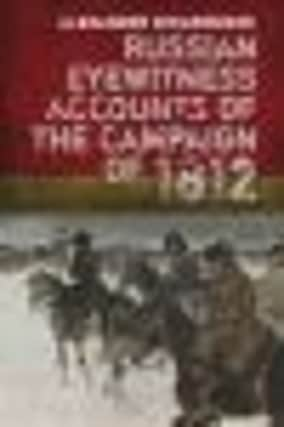Book review: Russian Eyewitness Accounts of the Campaign of 1812 by Alexander Mikaberidze


One single sentence sums up the grim and gruesome realities of life – and death – in 1812, one of the most brutal years of fighting in the long-running Napoleonic wars which ended at the Battle of Waterloo three years later.
The words were penned by Russian General Peter Konovnitsyn in November 1812 during Napoleon’s retreat from Moscow, a turning-point in the French leader’s fortunes.
Advertisement
Hide AdAdvertisement
Hide AdNapoleon’s decision to invade Russia with a pan-European Grande Armée of some 650,000 men ended in disaster when the Cossack cavalry, scorched earth tactics and the Russian winter got the better of the great tactician.
If his soldiers were not killed on the battlefield, they starved or froze to death – all witnessed by the massed troops of the Russian Emperor Alexander I.
Russia played a decisive role in the Napoleonic wars and their success in the struggle against France allowed Russian leaders to profoundly influence the course of European history. And yet of the tens of thousands of books written in non-Russian languages on this crucial period, very few have examined in detail the many dimensions of Russia’s long involvement with Revolutionary and Imperial France.
Alexander Mikaberidze makes a brilliant job here of putting the records straight, changing our assumptions and readjusting our analytical frameworks in this gripping translation of the accounts of the Russian soldiers who fought in and witnessed the pivotal 1812 campaign.
Advertisement
Hide AdAdvertisement
Hide AdHis unique, exciting and illuminating book, the first of a planned three-volume series, destroys the myth that the Russian army of 1812 was made up entirely of ignorant peasants led by inebriated officers.
Mikaberidze deploys the evidence of a rich collection of observers, including diplomats, courtiers, junior officers, generals and a lone sergeant, to bring us a new perspective on what was a ‘gargantuan’ campaign.
The graphic accounts provide a fascinating insight into the decisions of the Russian leadership, the dissension within the command in the early part of the campaign and the horrific experiences of the ordinary Russian soldier as he slowly made his way to victory.
Each chapter deals with an important episode of the 1812 campaign and features dozens of memoirs, letters and diaries. There are first-hand accounts of the initial retreat of the Russians in the face of Napoleon’s huge and intimidating army, the fall of Smolensk, the titanic clash at Borodino, one of the bloodiest battles of the age, and Napoleon’s disastrous retreat.
Advertisement
Hide AdAdvertisement
Hide AdFrom the Russian troops’ initial fear of France’s formidable soldier emperor to the final realisation that they had him on the run, we witness mind-numbing horrors and the appalling spectacle of bodies strewn in a wasteland of snow and ice in what contemporaries described as an ‘empire of death.’
We see a Russian general ‘so enormously stout that he could only be lifted onto a horse with the greatest difficulty’ and cruel scenes of massive French casualties at the frozen wastes of Berezina which belonged ‘to the realms of poetry, the most monstrous and mad type of poetry.’
Mikaberidze immerses his readers in the ‘warp and weft’ of this bloody campaign in ways which were previously impossible for English language readers. Engrossing, shocking and moving, this is an unmissable book which sheds new light on a dark corner of European history.
(Frontline Books, hardback, £25)